Related Research Articles
Radical feminism is a perspective within feminism that calls for a radical re-ordering of society in which male supremacy is eliminated in all social and economic contexts, while recognizing that women's experiences are also affected by other social divisions such as in race, class, and sexual orientation. The ideology and movement emerged in the 1960s.

Audre Lorde was an American writer, womanist, radical feminist, professor, and civil rights activist. She was a self-described "black, lesbian, feminist, socialist, mother, warrior, poet," who "dedicated both her life and her creative talent to confronting and addressing injustices of racism, sexism, classism, and homophobia."

Leontine Sagan was an Austrian-Hungarian theatre director and actress of Jewish descent. She is best known for directing Mädchen in Uniform (1931).

The gay liberation movement was a social and political movement of the late 1960s through the mid-1980s that urged lesbians and gay men to engage in radical direct action, and to counter societal shame with gay pride. In the feminist spirit of the personal being political, the most basic form of activism was an emphasis on coming out to family, friends, and colleagues, and living life as an openly lesbian or gay person.

Barbara Jean Hammer was an American feminist film director, producer, writer, and cinematographer. She is known for being one of the pioneers of the lesbian film genre, and her career spanned over 50 years. Hammer is known for having created experimental films dealing with women's issues such as gender roles, lesbian relationships, coping with aging, and family life. She resided in New York City and Kerhonkson, New York, and taught each summer at the European Graduate School.

Lesbian, gay, bisexual and transgender (LGBT) rights in Germany have evolved significantly over the course of the last decades. During the 1920s and early 1930s, lesbian and gay people in Berlin were generally tolerated by society and many bars and clubs specifically pertaining to gay men were opened. Although same-sex sexual activity between men was already made illegal under Paragraph 175 by the German Empire in 1871, Nazi Germany extended these laws during World War II, which resulted in the persecution and deaths of thousands of homosexual citizens. The Nazi extensions were repealed in 1950 and same-sex sexual activity between men was decriminalized in both East and West Germany in 1968 and 1969, respectively. The age of consent was equalized at 14 in East Germany in 1988 and in unified Germany in 1994.

Lesbianism is the sexual and romantic desire between women. There are historically far fewer mentions of lesbianism than male homosexuality, due to many historical writings and records focusing primarily on men.
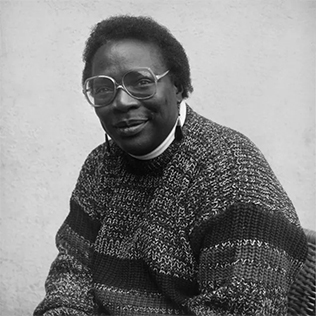
Pat Parker was an American poet and activist. Both her poetry and her activism drew from her experiences as an African-American lesbian feminist. Her poetry spoke about her tough childhood growing up in poverty, dealing with sexual assault, and the murder of a sister. At eighteen, Parker was in an abusive relationship and had a miscarriage after being pushed down a flight of stairs. After two divorces she came out as lesbian "embracing her sexuality" and said she was liberated and "knew no limits when it came to expressing the innermost parts of herself".

Dyke is a slang term, used as a noun meaning lesbian and as an adjective describing things associated with lesbians. It originated as a homophobic slur for masculine, butch, or androgynous girls or women. Pejorative use of the word still exists, but the term dyke has been reappropriated by many lesbians to imply assertiveness and toughness.

Manuela Kay is a German journalist, author and publisher.
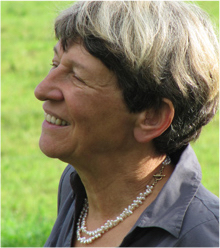
Cristina Perincioli is a Swiss film director, writer, multimedia producer and webauthor. She moved to Berlin in 1968. Since 2003 she has lived Stücken in Brandenburg.

Cäcilia (Cillie) Rentmeister is a German art historian, culture scientist and researcher of cultural conditions of women and of gender. In addition to studying the different realities in which men and women are living, she has concerned herself with the matriarchy.
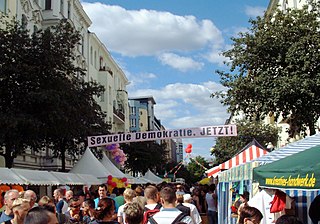
Berlin was the capital city of the German Empire from 1871 to 1945, its eastern part the de facto capital of East Germany from 1949 to 1990, and has been the capital of the unified Federal Republic of Germany since June, 1991. The city has an active LGBT community with a long history. Berlin has many LGBTIQ+ friendly districts, though the borough of Schöneberg is widely viewed both locally and by visitors as Berlin's gayborhood. Particularly the boroughs North-West near Nollendorfplatz identifies as Berlin's "Regenbogenkiez", with a certain concentration of gay bars near and along Motzstraße and Fuggerstraße. Many of the decisive events of what has become known as Germany's second LGBT movement take place in the West Berlin boroughs of Charlottenburg, Schöneberg, and Kreuzberg beginning in 1971 with the formation of the Homosexuelle Aktion Westberlin (HAW). Where as in East Berlin the district of Prenzlauer Berg became synonymous with the East Germany LGBT movement beginning in 1973 with the founding of the HIB. Schöneberg's gayborhood has a lot to offer for locals and tourists alike, and caters to, and is particularly popular with gay men. Berlin's large LGBT events such as the Lesbian and Gay City Festival, East Berlin Leather and Fetish Week, Folsom Europe, and CSD center around Schöneberg, with related events taking place city-wide during these events. Nevertheless, with roughly 180 years of LGBTIQ+ history, and a very large community made up of members with very varied biographies, it is hard to find a place in Berlin completely without LGBT culture past or present. Berlin's present-day neighborhoods with a certain concentration of LGBTIQ+ oriented culture vary somewhat in terms of history, demography, and where the emphasis in each neighborhoods' queer culture falls along the LGBTIQ+ spectrum. Over the course of its nearly two centuries of queer history (herstory), definitions not with standing, Berlin's LGBTIQ+ culture has never ceased to change, not only in appearance and self-understanding, but also in where the centers of queer culture were located in the city. What is true about Berlin's "LGBT culture in Berlin" at one point in time, in a given place and from a given perspective, is almost certainly different the next.
Gisela Weimann is a German multimedia artist who lives and works in Berlin. Her working techniques range from painting, printmaking, photography, sculpture and film to performance art and art in public space. She has also written and published several books and essays about her own work, art collaborations and art history topics. Her work often focuses on political - particularly feminist - themes and on art's relationship with political and social issues.
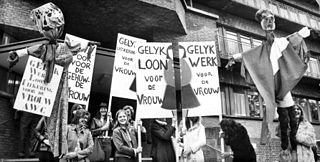
The women's liberation movement in Europe was a radical feminist movement that started in the late 1960s and continued through the 1970s and in some cases into the early 1980s. Inspired by developments in North America and triggered by the growing presence of women in the labour market, the movement soon gained momentum in Britain and the Scandinavian countries. In addition to improvements in working conditions and equal pay, liberationists fought for complete autonomy for women's bodies including their right to make their own decisions regarding contraception and abortion, and more independence in sexuality.
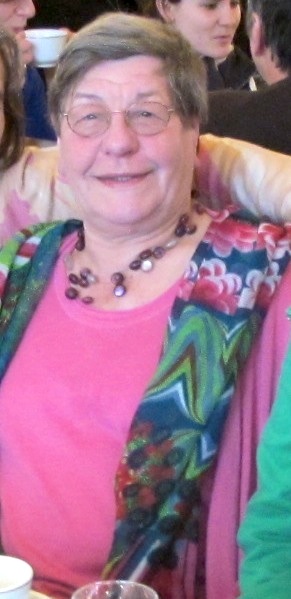
Ilse Kokula is a German sociologist, educator, author and lesbian activist in the field of lesbian life. She was awarded the Order of Merit of the Federal Republic of Germany.

Irmgard Schwaetzer is a German politician of the Free Democratic Party (FDP) and a Protestant church official. Since 2013, she has been chairing the Synod of the Evangelical Church in Germany (EKD). She is the central founding figure, as well as honorary chairwoman of the Liberal Women.

Friederike Nadig was a German politician of the Social Democratic Party (SPD). One of the four women members of the Parlamentarischer Rat who drafted the Basic Law for the Federal Republic of Germany in 1948/49, she was one of the Mothers of the Basic Law.
Ursula Sillge is a German sociologist and LGBT activist. She organized the first national lesbian gathering in East Germany, and between 1970 and 1990 was one of the main lesbian activists in the country, pressing authorities to recognize the rights and allow visibility of the LGBT community. In 1986, she founded the Sunday Club in Berlin. It was the only secular association representing homosexuals in the 1980s, though it was not officially recognized. The organization became the first legal association to represent the LGBT community in East Germany when it was allowed to register in 1990. Sillge resigned as director of the Sunday Club in 1991 to found the LGBT archive known as the Lila Women's Archives. After the fall of the Berlin Wall, she was able to earn her doctorate. In addition to running the archives, she has published several works about homosexuality and women behind the Iron Curtain.
References
- 1 2 "1950-72 Lesbian Life before Liberation | Berlin Goes Feminist". 23 January 2015. Retrieved 20 February 2019.
- ↑ Mehl, Friederike. "Über Lesbisches Aktionszentrum Westberlin (LAZ)" (in German). Digitales Deutsches Frauenarchiv. Retrieved 5 March 2019.
- ↑ "Spinnboden | visitBerlin.de". www.visitberlin.de. Retrieved 20 February 2019.
- ↑ "Spinnboden: Gisela Necker". www.spinnboden.de. Retrieved 20 February 2019.